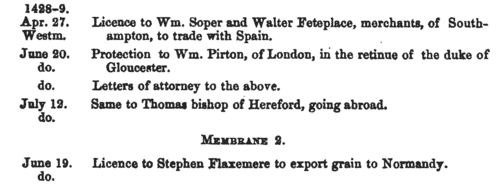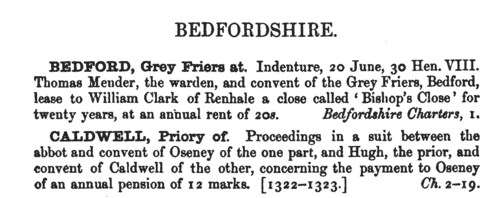Lodes Surname Ancestry ResultsOur indexes 1000-1999 include entries for the spelling 'lodes'. In the period you have requested, we have the following 6 records (displaying 1 to 6): Buy all | | | Get all 6 records to view, to save and print for £24.00 |
These sample scans are from the original record. You will get scans of the full pages or articles where the surname you searched for has been found. Your web browser may prevent the sample windows from opening; in this case please change your browser settings to allow pop-up windows from this site. Oblata or Fine Rolls
(1200-1216)
All the surviving oblata or fine rolls of the reign of king John were edited by Thomas Duffus Hardy and printed by the Commissioners of the Public Records in 1835. These are the oblata rolls of the 1st, 2nd and 3rd years of the reign, and the fine rolls of the 6th, 7th, 9th, 15th, 16th and 17th years. These rolls contain notices of the oblations or fines offered to the Crown to procure grants and confirmations of liberties and franchises of markets, fairs, parks and free warren; for exemption from tolls, pontage, passage and murage; to obtain justice and right; to stop, delay or expedite pleas, trials and judgments; and to remove suits and processes from inferior tribunals into the King's Court. Fines were also extracted for licence to trade, or permission to exercise commerce or industry of any kind, and to have the aid, protection, or goodwill of the King; to mitigate his anger or abate his displeasure; to be exempted from knighthood either for a term or for ever, and from attending the King in his foreign expeditions; they were also demanded for seisin or restitution of ancestral lands or chattels; for allowing delinquents to be replevied or bailed; for acquittal of murder; and for pardon of trespasses and misdemeanours; for the 'year and a day' of the lands and goods of felons and fugitives. Almost all entries have the county in question indicated in the left hand margin.LODES. Cost: £4.00.  | Sample scan, click to enlarge

| Grantees of offices, commissions and pardons
(1317-1321)
The Patent Rolls are the Chancery enrolments of royal letters patent. Those for the 11th to the 14th years of the reign of king Edward II (8 July 1317 to 7 July 1321) were edited for the Public Record Office by G. F. Handcock, and published in 1903. The main contents are royal commissions and grants; ratifications of ecclesiastical estates; writs of aid to royal servants and purveyors; and pardons. Most extensive are the commissions of oyer and terminer to justices to investigate complaints about specific crimes and wrongs in particular counties.LODES. Cost: £2.00.  | Sample scan, click to enlarge

| The English in France
(1460)
King Henry VI of England (one of the grandsons of Charles VI of France) claimed the throne of France (and quartered the fleurs-de-lis of France with the lions of England on the royal standard) as had his predecessors since Edward III, as descendants of Philip IV of France. The English had real power or influence in Brittany, Normandy, Flanders and Gascony, and actual possession of several coastal garrisons, in particular Calais, where the French inhabitants had been replaced by English. Henry VI came to the throne only seven years after his father had trounced the French at Agincourt; but his cousin, Charles VII, who became king of France in the same year, spent his long reign rebutting the English king's claim to his throne by territorial reconquest and consolidation. The English administration kept a series of records called the French Rolls. On these are recorded royal appointments and commissions in France; letters of protection and safe-conduct to soldiers, merchants, diplomats and pilgrims travelling to France from England and returning, and to foreign legations. There are also licences to merchants to export to the Continent, and to captains to transport pilgrims. As Henry VI's reign progressed, and the English grip on northern France loosened, the French Rolls also increasingly include entries concerning the ransoming of English prisoners.LODES. Cost: £6.00.  | Sample scan, click to enlarge

| Suffolk Charters
(1460-1469)
A large accumulation of documents preserved in the Bodleian Library, Oxford, formerly constituted the antiquarian collections of Anthony a Wood, Roger Dodsworth, Ralph Thoresby, Thomas Martin of Palgrave, Thomas Tanner bishop of St Asaph, Dr Richard Rawlinson, Richard Furney archdeacon of Surrey, and Richard Gough. A calendar of these was prepared by William H. Turner and published in 1878 under the title 'Calendar of Charters and Rolls preserved in the Bodleian Library'. The word 'charters' is here used in a rather loose sense, including virtually any manuscript or copy of a manuscript, but the bulk of the contents consists of mediaeval deeds of conveyance. Turner's calendar deals with each briefly, naming the principal parties and the nature of the deed, but hardly ever lists the witnesses. Many of these charters were undated (dating of deeds did not become general until around 1350) or so damaged or defective ('mutilated' is Turner's usual description) as no longer to display a legible date. However, he contrived, from the style of the script and/or the nature of the contents, to estimate dates in such cases. The sample scan is from the start of the Bedfordshire list. LODES. Cost: £4.00.  | Sample scan, click to enlarge

| Official Papers
(1676-1677)
The State Papers Domestic cover all manner of business relating to Britain, Ireland and the colonies, conducted in the office of the Secretary of State as well as other miscellaneous records, including lists of passes to travel abroad. This edition by F. H. Blackburne Daniell, covers the period from 1 March 1676 to 28 February 1677, and was published in 1909.
LODES. Cost: £4.00.  | Sample scan, click to enlarge

| Nottinghamshire Marriage Licences
(1577-1700)
Nottingham Archdeaconry, which was almost coextensive with the county of Nottingham, lay in the diocese and province of York, but it had substantially independent jurisdiction for both probate and the issuing of marriage licences. These are abstracts of the archdeaconry marriage licences: they usually state the groom's address, occupation, age, and condition; the bride's address, age and condition; and the names of the churches or parishes at which it was intended the marriage would be celebrated. Not all licences led to marriages. Where the age given is 21, it should be construed as '21 or over'. There was no obligation for the marriage to take place at the parish suggested, but the licence would only be valid within the county. These abstracts have been annotated with extra information found on the marriage bonds. 26 Nottinghamshire parishes (Beckingham, Darlton, Dunham, Eaton, North Leverton, Ragnall, Rampton, South Wheatley, Cropwell Bishop, Bleasby, Blidworth, Calverton, Caunton, Edingley, Farnsfield, Halloughton, Holme, Kirklington, Morton, North Muskham, Norwell, Oxton, South Muskham, Southwell, Upton and Woodborough) lay within the small peculiar jurisdiction of Southwell, which issued its own licences: abstracts of these for the period 1588 to 1754 are also included here.LODES. Cost: £4.00.  | Sample scan, click to enlarge

|
Research your ancestry, family history, genealogy and one-name study by direct access to original records and archives indexed by surname.
|








